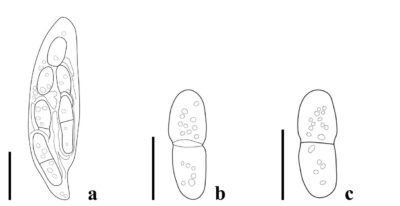Fungalpedia – Note 523, Austroafricana
Austroafricana Quaedvl. & Crous
Citation when using this data: Tibpromma et al. 2024 (in prep.) – Fungalpedia, Fungal pathogens.
Index Fungorum, Facesoffungi, MycoBank, GenBank, Fig. 1
Classification: Teratosphaeriaceae, Mycosphaerellales, Dothideomycetidae, Dothideomycetes, Pezizomycotina, Ascomycota, Fungi.
Quaedvlieg et al. (2014) introduced Austroafricana within Teratosphaeriaceae in Mycosphaerellales with the type species Austroafricana associata based on combined ITS and LSU sequence data. Morphologically, Austroafricana is similar to Teratosphaeria, and it is difficult to identify characteristics to separate them (Quaedvlieg et al. 2014). Austroafricana characterized by subepidermal to erumpent, pseudothecial, black ascomata, fasciculate, bitunicate, obovoid to ellipsoidal, aparaphysate, but with remains of hamathecium visible asci, fusoid-ellipsoidal with obtuse ends, tri to multiseriate, overlapping medianly 1-septate, tapering towards both ends, but more prominently towards the lower end, with or without persistent mucus sheath ascospores (Quaedvlieg et al. 2014). Currently, three species viz; Austroafricana associata (type species), A. keanei, and A. parva (a pathogen of Eucalyptus and Proteaceae (Crous et al. 2008)) have been accepted. Members of this genus have been reported to be pathogenic species that co-colonize host lesions and exhibit a broad host range in Australia and South Africa (Quaedvlieg et al. 2014).
Type species: Austroafricana associata (Crous & Carnegie) Quaedvl. & Crous
Other accepted species: Species Fungorum – search Austroafricana
Figure 1 –Morphology of Austroafricana associata. a Ascus. b-c Ascospores. Scale bars: a-c = 10 μm. Redrawn from Crous et al. (2007).
References
Entry by
Zhang X, Excellence Center of Microbial Diversity and Sustainable Utilization, Department of Biology, Faculty of Science, Chiang Mai University, Chiang Mai 50200, Thailand; Center for Yunnan Plateau Biological Resources Protection and Utilization, College of Biological Resource and Food Engineering, Qujing Normal University, Qujing, Yunnan 655011, China
(Edited by Saowaluck Tibpromma, Samaneh Chaharmiri-Dokhaharani, & Achala R. Rathnayaka)
Published online 9 December 2024
